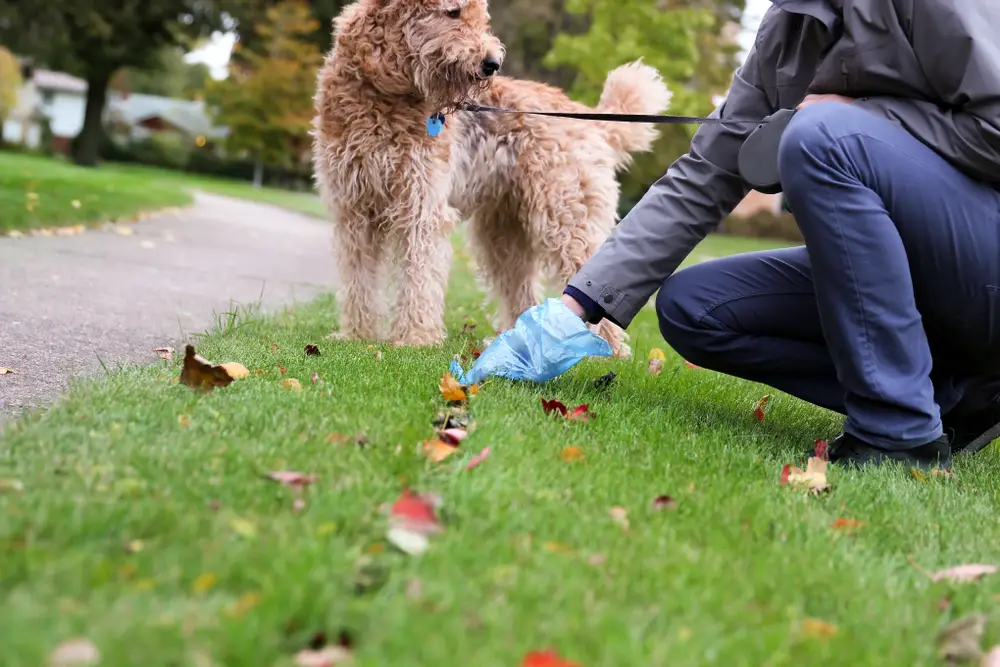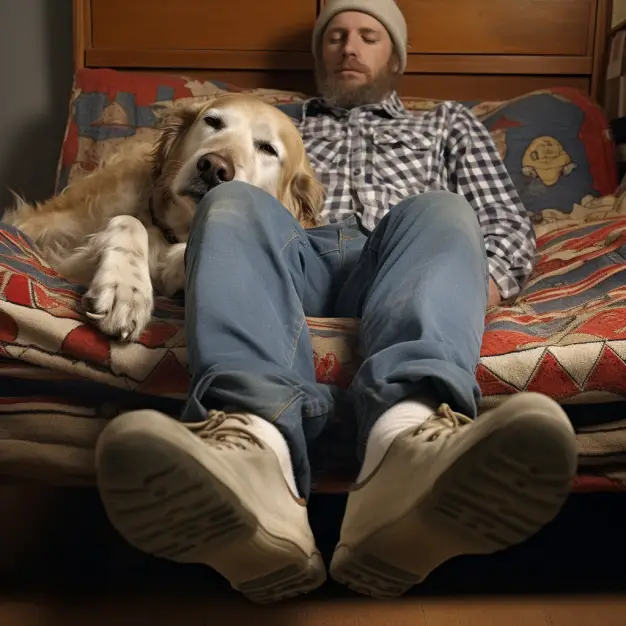Why Is My Dog’s Poop Cold? Understanding Your Canine’s Peculiar Poo
As a dog owner, it’s only natural to be curious about every aspect of your canine companion’s life – from their diet and exercise habits to their grooming needs and even the state of their poop. Observing your dog’s poop might not be the most pleasant task, but it can provide valuable insights into their overall health and well-being.
One question that may have crossed your mind is, “Why is my dog’s poop cold?” While it might seem like a trivial concern, understanding the temperature of your dog’s poop can help you identify potential health issues early on.
In this comprehensive guide, we’ll delve into the various factors that can affect the temperature of your dog’s poop, signs to watch out for, and how to maintain your dog’s overall health. So, let’s dive into the world of your canine’s peculiar poo and unravel the mystery behind its chilly nature.
What’s the Normal Temperature of Dog Poop?
The impact of the dog’s body temperature
The temperature of fresh dog poop is typically influenced by the dog’s internal body temperature. A healthy dog’s body temperature usually ranges between 101 and 102.5 degrees Fahrenheit (38.3 to 39.2 degrees Celsius). When your dog poops, the fecal matter is at or near their internal body temperature. However, it’s important to note that the temperature of your dog’s poop can vary depending on several factors, which we will discuss later in this guide.
The cooling process of dog poop
Once your dog’s poop makes its way outside, it will naturally start to cool down. The rate at which this happens depends on various factors, including the temperature of the environment and the composition of the poop itself. In general, dog poop cools rapidly and may feel cold to the touch within minutes. This cooling process is entirely normal and should not be a cause for concern. In fact, it’s the same process that happens with most warm-blooded animals, including humans.
Factors Affecting the Temperature of Dog Poop
1. Weather conditions and outdoor temperature
One of the most significant factors affecting the temperature of your dog’s poop is the ambient temperature of the environment. In cold weather, your dog’s poop will cool down more rapidly, making it feel colder to the touch. On the other hand, during warmer months, the poop may retain its warmth for a slightly longer period before reaching the temperature of the surrounding air.
2. The size and breed of your dog
Different dog breeds have varying body temperatures, which can influence the initial temperature of their poop. Additionally, the size of your dog can also play a role. Larger dogs have a higher surface area and may retain heat better, leading to slightly warmer poop. In contrast, smaller dogs with a lower surface area might lose heat faster, resulting in cooler poop.
3. The age of your dog
The age of your dog can also affect the temperature of their poop. Puppies, for instance, have a slightly higher body temperature than adult dogs. As a result, their poop may initially be warmer. However, as your dog ages and their body temperature normalizes, you may notice a change in the temperature of their poop.
4. Your dog’s diet and its effect on poop temperature
Your dog’s diet can significantly impact the temperature of their poop. A diet high in moisture content, such as wet food or a raw food diet, can lead to poop that cools down more quickly due to the higher water content. Conversely, a diet consisting mainly of dry kibble may result in poop that retains warmth for a longer period.
5. Poop composition and moisture content
The composition and moisture content of your dog’s poop are also crucial factors that determine its temperature. Poop with a higher water content will generally cool down faster as the water evaporates. Furthermore, the presence of undigested food particles or other substances in the poop can affect how quickly it cools down.
Is Cold Poop a Sign of Health Issues?
When to worry about your dog’s cold poop
While cold poop is generally not a cause for concern, there are instances when it may indicate an underlying health issue. It’s essential to pay attention to other aspects of your dog’s poop, such as color, consistency, and odor, to determine if there’s a potential problem. If you notice any changes in these attributes, along with cold poop, it’s crucial to monitor your dog’s overall health and consult with a veterinarian if needed.
Common health issues related to cold dog poop
1. Dehydration
Cold poop can be a sign of dehydration in your dog, especially if the fecal matter is dry, hard, and crumbly. Dehydration can occur for various reasons, such as insufficient water intake, excessive heat, or illness. It’s vital to ensure that your dog always has access to clean, fresh water and monitor their hydration levels.
2. Parasites and infections
Parasitic infections, such as worms or giardia, can cause changes in your dog’s poop, including its temperature. If you notice cold poop accompanied by diarrhea, mucus, or blood, it could indicate a parasitic infection. In such cases, it’s essential to consult your veterinarian for appropriate treatment.
3. Gastrointestinal issues
Cold poop can also be a sign of gastrointestinal issues, such as food sensitivities, allergies, or inflammatory bowel disease. If your dog’s poop is consistently cold and accompanied by other symptoms like diarrhea, vomiting, or weight loss, it’s crucial to seek veterinary advice to determine the underlying cause and receive appropriate treatment.
When to consult a veterinarian
If you’re ever in doubt about your dog’s health or the state of their poop, it’s always best to consult your veterinarian. They can perform a thorough examination, assess your dog’s overall health, and recommend any necessary tests or treatments to ensure your furry friend stays in tip-top shape.

How to Monitor Your Dog’s Poop for Health Concerns
The four Cs: color, consistency, content, and coating
To effectively monitor your dog’s poop for potential health issues, it’s essential to pay attention to the four Cs: color, consistency, content, and coating. A healthy poop is typically brown, well-formed, and moist without being too wet. It should also be free of any foreign objects, mucus, or blood. By regularly assessing these attributes, you can quickly identify any changes that may warrant further investigation.
Regular check-ups and preventative care
Scheduling regular check-ups with your veterinarian is an essential part of ensuring your dog’s overall health. These visits allow your vet to monitor your dog’s health, administer necessary vaccinations, and address any concerns you may have, including those related to your dog’s poop. Preventative care, such as deworming and flea and tick prevention, can also help protect your dog from common health issues that could affect their poop.
Keeping a poop diary to track changes
To stay on top of your dog’s poop and overall health, consider maintaining a poop diary. This simple yet effective tool can help you track any changes in your dog’s poop, including its temperature, color, consistency, and frequency. By noting these details daily, you can quickly identify patterns or abnormalities that may require further attention. Additionally, having this information readily available can be beneficial during your dog’s veterinary visits, as it can help your veterinarian make a more accurate assessment of your dog’s health.
How to Maintain Your Dog’s Overall Health
1. Provide a balanced and nutritious diet
Feeding your dog a balanced and nutritious diet is crucial for their overall health and well-being. Ensure that their food meets their specific nutritional requirements based on their breed, age, size, and activity level. A high-quality diet will not only support your dog’s general health but can also improve the quality of their poop.
2. Ensure proper hydration
Proper hydration is essential for your dog’s health, as it supports digestion, nutrient absorption, and waste elimination. Always provide your dog with access to clean, fresh water and monitor their intake. If you notice any changes in their drinking habits or suspect dehydration, consult your veterinarian for guidance.
3. Regular exercise and mental stimulation
Regular physical activity and mental stimulation are vital for maintaining your dog’s overall health. Exercise helps to maintain a healthy weight, supports good digestion, and can even improve the quality of their poop. Ensure your dog receives age-appropriate exercise and engages in mentally stimulating activities to keep them happy, healthy, and mentally sharp.
4. Grooming and parasite prevention
Proper grooming and parasite prevention are essential aspects of maintaining your dog’s health. Regular grooming, including brushing and bathing, can help keep your dog’s skin and coat healthy. Additionally, using flea and tick prevention products and administering regular deworming treatments can protect your dog from common parasites that may impact their health and the quality of their poop. Make sure to consult your veterinarian for recommendations on appropriate parasite prevention products for your dog.
Final Thoughts
Now that you’ve delved into the world of your canine’s peculiar poo, you should have a better understanding of why your dog’s poop may be cold. As we’ve discussed, several factors can influence the temperature of your dog’s poop, such as weather conditions, your dog’s breed and size, age, diet, and the composition of the poop itself. In most cases, cold poop is a normal occurrence and not a cause for concern.
However, it’s crucial to remain vigilant and observe your dog’s poop for any changes that could indicate an underlying health issue. By paying attention to the four Cs (color, consistency, content, and coating), scheduling regular veterinary check-ups, and providing your dog with a balanced diet, proper hydration, exercise, and grooming, you can ensure that your furry friend stays healthy and happy. Remember, when it comes to your dog’s health, it’s always better to be proactive and consult your veterinarian if you have any concerns about their poop or overall well-being.
Frequently Asked Questions
Can the temperature of my dog’s poop change based on the time of day they poop?
The temperature of your dog’s poop may change slightly based on the time of day due to fluctuations in the surrounding environment. For example, during the early morning or late evening, when outdoor temperatures are cooler, your dog’s poop may cool down more quickly compared to when they poop during the warmer daytime hours. However, these variations are typically minimal and should not be a cause for concern.
Is there a specific diet I should feed my dog to avoid cold poop and potential health issues?
There is no specific diet to prevent your dog’s poop from being cold, as cooling down is a natural process. However, providing your dog with a balanced and nutritious diet tailored to their age, breed, size, and activity level can help maintain their overall health and improve the quality of their poop. Consult your veterinarian for personalized dietary recommendations for your dog.
Can medications or supplements affect the temperature of my dog’s poop?
Medications or supplements might not directly affect the temperature of your dog’s poop. However, they can influence the composition and moisture content of the poop, which can indirectly affect how quickly it cools down. If you have concerns about your dog’s poop while they are taking medications or supplements, consult your veterinarian for advice.
Are certain dog breeds more prone to having cold poop than others?
The temperature of a dog’s poop is generally influenced by factors like body temperature, size, and breed. While some breeds might have slightly higher or lower body temperatures than others, the differences are usually minimal and not significant enough to make one breed more prone to having cold poop than another. The cooling process of poop is a natural occurrence for all dog breeds.
How can I keep my dog’s poop warm during winter months to avoid it becoming too cold?
Attempting to keep your dog’s poop warm is not necessary, as the temperature of the poop is not a direct indicator of your dog’s health. Cold poop during winter months is entirely normal due to the surrounding environment’s lower temperature. Instead, focus on ensuring your dog’s overall well-being by providing them with a balanced diet, proper hydration, exercise, and regular veterinary care.






